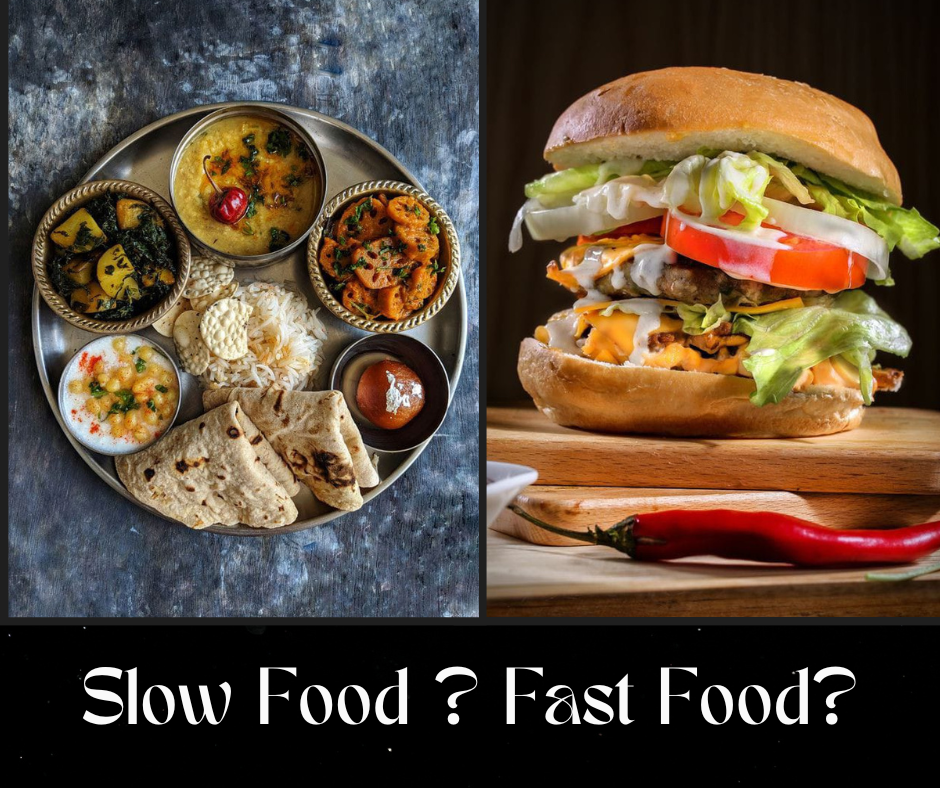Time is the most precious commodity today. We live in the world of automation and strategies of having maximum work done in minimum time.
Sadly, the thought process that we are building due to this reflects in our personal life as well.
Resorting to fast-food, ready-made mixes etc is a result of the same. Fast food is easy to cook/order, minimum efforts needed and more than that, eating fast food is a source of quick gratification.
However, amidst this frenzy, we often overlook the significance of slow food – a mindful, sustainable approach to eating. In this blog, let’s delve into the advantages of adopting slow food practices and shed light on the disadvantages of relying on fast food.
What exactly is slow food? What is fast food? How are they different?
Fast Food | Slow Food |
Convenient and quick: | Mindful and slow preparation: |
Highly processed ingredients irrespective of seasonal availability: | Local, seasonal ingredients available only in specific seasons: |
Standardised menus: | Traditional cooking methods: |
Mass operations: | Cultural heritage: |


Why should we opt for slow food?
This is the food which our traditional cooking methods make. All that we saw our grand parents making. The slow cooking, on a low flame, the simmering for a certain time, the gradual roasting etc are all in the category of slow food. Here are a few advantages of slow food:
- Mindful cooking and eating experience: Slow food is not just about the food itself; it encompasses the entire experience of savoring a meal. Across cultures we see that the traditional food focuses on the little but important things like different textures, freshly ground spices, inclusion of all types of taste like sweet, sour, spicy, bitter etc. By slowing down and paying attention to the flavors, textures, and aromas of the food we consume, we cultivate a deeper connection with our meals. This practice encourages mindful eating, allowing us to truly appreciate and enjoy the nourishment that food provides.
- Nutritional benefits: Fast food often falls short when it comes to nutrition. It is typically not only cooked at high temperatures, but also high in unhealthy fats, added sugars, sodium, and lacks essential nutrients. On the other hand, slow food emphasizes fresh, whole ingredients that are minimally processed cooked with slower and gradual cooking methods. This approach ensures a higher intake of vitamins, minerals, fiber, and beneficial phytochemicals, contributing to better overall health and well-being. Over and above this, slow cooking prevents the formation of AGE – Advanced glycation end -products or glycotoxins. These represent pathogenic compounds linked to the development of many chronic diseases*. Hence all the cooking methods our ancestors used seem to be the most beneficial.
- Takes care of the psychological functions of food: Food has one more important role to play in our life apart from providing nutrition. And that is the of making us feel satisfied and happy. It is not just about the quick gratification like the one we get by the release of dopamine when we have fast food. Preparing and enjoying slow food can be a communal experience that brings people together. It encourages shared meals, meaningful conversations, and quality time with loved ones. By embracing slow food, we create opportunities to strengthen family bonds, foster cultural traditions, and build a sense of community. The experience of cooking, serving and eating slow food creates good memories with food. When we cook in traditional ways and eat savour the food with our near ones, it fosters a sense of belongingness and good relationships. Thus, this is directly be related to the strengthening of our Muladhar or root chakra which gives a sense of belongingness.
As we navigate a world that seems to be constantly moving faster, embracing the slow food cooking becomes increasingly vital. By shifting our focus from quick and convenient meals to mindful, sustainable eating, we can reap numerous benefits for ourselves not only in terms of health and fitness, but also to our communities, and the planet. So, the next time you are searching for a fast food restaurant near you, think twice. Instead, let’s savor the journey of preparing and enjoying slow food, nourishing both our bodies and our souls.
*https://www.ncbi.nlm.nih.gov/pmc/articles/PMC3704564/

